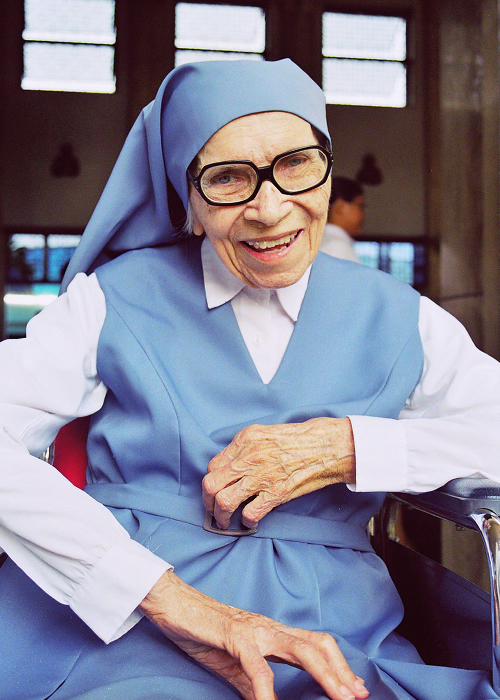Sr. Melania Ravarotto

In Love with Christ, Fueled by God
Sr. Melania Ravarotto was among the few, surviving Italian pioneers of the Daughters of St. Paul in the Philippines. While a few had returned to Italy and are already dead and others have been assigned elsewhere, she chose to remain in the country. She had a permanent visa and desired to spend her last days here. Despite her age of 83 she was always serene and happy. Her community, the big community of the Regina Apostolorum enjoyed seeing her following faithfully the community schedule. Below is a short interview extracted from the Paulines Magazine.
Paulines: Sr. Melanie would you like to tell us something about your childhood?
Sr. M: Oh, yes! I am from Padova (Padua), Italy. Since I was born on Easter Sunday, my parents named me Pasqua and they used to call me Pasqualina. I have one brother, who is now dead, and three sisters, one of whom is still alive. My house was near the church so it was very easy for me to run to the church for religious functions and to attend Mass. When I was six, I made my first communion and I learned the prayers from my mother. I had some friends, both boys and girls, but I had one special friend, a girl. Both of us wanted to become Sisters. We went to church together and we played together.
Paulines: How old were you when you started to dream of becoming a Sister?
Sr. M: I was 12 and my friend was 14. But we did not know what congregation to join. Then one day we saw the Daughters of St. Paul. They were invited by our parish priest to conduct a Gospel Week. They brought many Bible and other books. My friend and I approached them and we said we wanted to become Sisters too. Then they spoke to our parents. When they left they brought us with them to their convent. (Smiles)
Paulines: Did you immediately go to the Mother House?
Sr. M: No. At first we went to Rovigo, a branch house, then afterwards to Alba, Cuneo. The sisters told us we were still young so we had to study. We were many and we were very happy to go to propaganda (book diffusion). In the novitiate, also in Alba, we were about forty people. I made my first profession on January 15, 1939. Then I was sent to Trieste where Maestra Elena Ramondetti was superior. When I was a novice, I told my formator that I wanted to go to the mission. She told Prima Maestra (Mother Thecla Merlo) about it and she did not forget! That’s why after my first profession, I was told by Prima Maestra to study driving because it was needed in the mission.
Paulines: Did you speak often with Mother Thecla?
Sr. M: Yes, many times. She was always kind. I was a student driver when I drove Prima Maestra to her home in Castagnito. She told me, “You are a very good driver now. May be you can already go to the mission.” In 1939 when Sr. Edvige Soldano visited Rome after the foundation of the house in Philippines, Prima Maestra told me that I was going with her. So I came. I met again Maestra Elena here.
Paulines: Did you have any encounter with Primo Maestro?
Sr. M: A few times. He was really a man of action and of prayer. The times I met him on the way, he was holding his rosary and praying. He often gave us meditation. Before our trip to the Philippines, he gave us some advice.
Paulines: How did you find your mission place?
Sr. M: Oh, very well! People were very kind. In the beginning, they thought we were Americans so they spoke to us in English, but we did not understand English, only Spanish. But we studied English, also Tagalog. Before learning those languages, we were making our propaganda through sign language but we spread many books. Then I learned to eat Filipino food. I like very much pancit, balut and durian.
Paulines: Do you have any sad experience in the Philippines?
Sr. M: Yes, during the war. The Japanese wanted to kill all the Italians, of course only the men, including priests, but good that it did not happen. Then they also burned our house in Lipa. We lost many things, but thank God we received help from some people and from Maestra Paola Cordero who was superior in the United States.
Paulines: How about funny ones, you remember any?
Sr. M: (Laughs) Of course! I will tell you something that happened in Cagayan de Oro. The Bishop, knowing that we were poor, used to send us vegetables, fruits and sometimes meat. Once, when they killed a pig, he sent some kilos to us. I called him by phone to thank him, “Monsignor, thank you for the pig.” He was a little surprised. “Which pig, Sister?” “The pig you sent us this morning.” “Did I send you … Ah, yes, I remember, the pork. Did you cook it today?” When I put down the phone I told the sisters and they laughed. Nahiya ako. But I also laughed because it was very funny.”
Paulines: In what places have you been assigned and what were your assignments?
Sr. M: Lipa, Cebu, Davao, Cagayan de Oro, Naga, Iloilo, Bacolod, Pasay. I was superior in four houses, but I was always the driver. Sometimes I also went out for propaganda. When I came to Pasay I did commission work for the sisters of the province: working for the visa of those going abroad, buying plane and boat tickets, sending packages to other places, taking our packages coming from Rome from the Bureau of Customs.
Paulines: Did you find it easy to approach the people at the Immigration and the Customs?
Sr. M: Quite easy. They were always very good to me. They never asked me for extra payment because they knew that the sisters were poor. And with little humility, I did not find trouble with anyone in those places. Also in the post office now, they call me “Lola” and I have to bring candies for the street children who always run to meet me.
Paulines: When you were driving, were you not sometimes afraid?
Sr. M: No, why be afraid? I enjoyed driving for the sisters because it is just like driving for the Lord. I felt a bit sorry when I was told by the superior not to drive any more. I was a driver for more than 40 years and thank God I never met any accident. I always prayed to St. Paul, to the Guardian Angel and to the souls in Purgatory. They protected me. And naturally, I prayed much to Our Lady. Even while driving I prayed the rosary.
Paulines: How many times did you go to Italy for vacation?
Sr. M: Several times because our Constitutions say we can go home every three years. But I was not compelled to go every three years. Sometimes when I went after six years and now I don’t want to go for vacation anymore. The last time I went to Italy was during my Golden Jubilee of Profession. I celebrated it in Pasay, but they asked me to go to Italy to see my co-novices. Many have already died. I still met my friend from my town, Sr. Victoria Fasolo. She died last year. (Pensive)
Paulines: What did you enjoy most in Italy that you did not find in the Philippines?
Sr. M: You cannot compare because every place is different. There are things in the Philippines that you do not find in Italy and vice-versa. I love the Philippines and I want to die here.
Paulines: Will you please tell the younger members of the congregation what is the secret of your happy and holy life? Tell them how to survive and persevere in joy and in serenity.
Sr. M: I don’t know if it is a secret! Everybody knows that first of all we must be in love with Christ. Then we must be faithful to our prayer life, follow our Constitutions and the demands of our vows and community life. We have also to remember the four wheels of the Congregation. We have to do the apostolate but we have also to pray. Primo Maestro and Prima Maestra also told us to pray to the Blessed Virgin Mary. She is the mother of good vocations.
Paulines: Thank you for coming to the Philippines, Sr. Melanie. Thank you for your presence now. We hope we can follow your examples and be happy like you!
Sr. Melania passed away on March 11, 2004. She came to the Philippines in 1939, her first and only mission land, at the age of 21 after her first profession in Italy.
On her years of being a devoted missionary she once said, “The secret is to be always happy to do things for God, to please Him. Because here we are to serve the Lord, here on earth…”
She opened the house in Cebu, Davao, Cagayan de Oro and Iloilo. Transferred to Pasay after 18 years in the branch house, she was assigned as diffuser and errand sister in this big community, being an expert driver. When she took her driver’s license, she had the distinction of being the first woman driver in the country. From being a pioneer superior for 15 years to being an errand sister for the next 30 years did not bring a crisis in her life. One can safely presume that for her, the work of an errand sister is as equally dignified as the office of a superior. She was running errands to the post office, airport, seaport, foreign embassies, markets, hospitals, bus stations, and so on.
Sr. Melanie had done it all for the love of God even through the rough roads as she herself said, “Well, naturally there are problems but after all, we try our best to go ahead just the same. Pray, because it is prayer which will guide us much.”
Following the path trodden by this faithful servant will surely lead to the One who fuelled her life with faith, hope and love.
